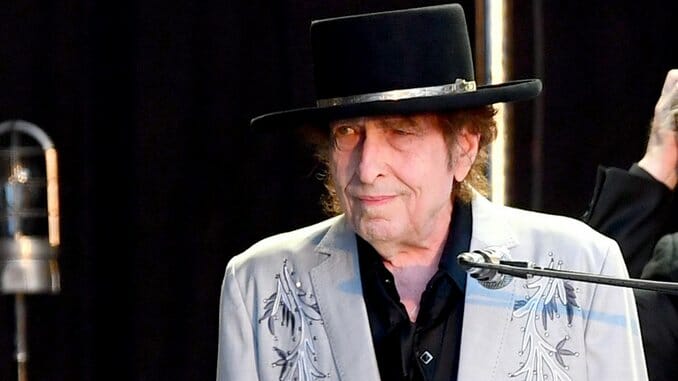Bob Dylan Contains Multitudes on Rough and Rowdy Ways
Iconic singer is at his most Dylan-esque on 39th studio LP
Photo via Getty Images
How appropriate that Bob Dylan is back, in the midst of a global pandemic and deepening civil rights crisis, with his first album of original material in eight years. There’s something almost reassuring about a musician who has remained willfully opaque for decades reemerging at this particular moment to croak existential riddles over hot blues licks.
It’s tempting to see Rough and Rowdy Ways as one of those late-career ruminations on mortality that often seem to come from musicians of a certain age, or a full-circle accounting that reconnects Dylan, now 79, with his early days as a folk singer with a socially conscious bent. On the surface, the album could be either of those things, or both: After all, he gives over nearly 17 minutes of his 39th studio LP to a single song about the day that John F. Kennedy was assassinated, in 1963, when the singer was 22. Yet the idea that he’s revisiting his youth, or settling his affairs, is too simple, too predictable, for a wily contrarian like Dylan. Since when has he ever done the obvious thing?
Indeed, his latest comes after three albums spent rummaging around in the American songbook, an exercise that amounted to a gracious courtesy call from a guy who knows a few things about writing songs that endure. It’s hard to say what effect, if any, burrowing into those touchstone tunes has had on his own writing. Rough and Rowdy Ways simply sounds like Dylan, at his most Dylan-esque. These 10 tracks are steeped in American history, classical symbolism and biblical imagery, to say nothing of the literary asides, pop-culture references and musical allusions, from Shakespeare and William Blake to Ginsburg, Corso and Kerouac, Indiana Jones to Altamont, Chopin to Charlie Parker to “them British bad boys, the Rolling Stones,” as Dylan puts it on opener “I Contain Multitudes.”
It’s a pensive, torchy song that puts Dylan’s voice right up front, which makes sense: The tune is perhaps the crux of the album, and maybe even his career: Dylan has always contained multitudes, from protest songs to Christianity to winning the Nobel Prize for literature, and he’s bristled over the years at attempts to define—and thereby confine—him as an artist. (That’s why we didn’t give this album a numerical score: grading Dylan, on an album like this one, just feels reductive.) He writes songs, and he sings songs, and the rest amounts to a confluence of outside perspectives while he’s busy throwing shadow puppets in the far corners of his imagination.
-

-

-

-

-

-

-

-

-

-

-

-

-

-

-

-

-

-

-

-

-

-

-

-

-

-

-

-

-

-

-

-

-

-

-

-

-

-

-

-








































